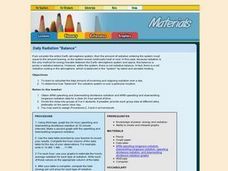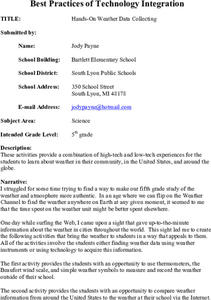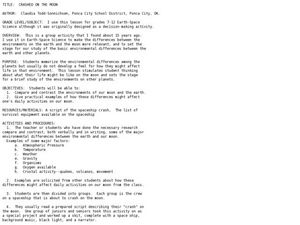NASA
Down to Earth
There are only 10 types of people in the world: those who understand binary and those who don't. The lesson includes four activities in which students learn binary, convert binary to images, understand CCD arrays, and interpret...
National Wildlife Federation
The Amazing Adventures of Carbon: How Carbon Cycles through the Earth
Here's a stat for your pupils: 18 percent of the human body is carbon! Part 10 in the series of 12 takes pairs on an adventure through the carbon cycle. After a class reading about carbon, pairs read and choose their own adventure...
NOAA
Ocean Currents
Go with the flow! The eighth installment in a 13-part series has earth science students dive in to the world's system of ocean currents. The interactive illustrates the different types and depths of currents, how wind and gravity...
Curated OER
(S-1) Sunlight and the Earth
Students discuss the solar heating of the Earth and atmosphere, its heat loss proceses, and the way these relate to weather and climate.
Curated OER
Using Radiosonde Data From a Weather Balloon Launch
Student use radiosonde data from a weather balloon launch to distinguish the characteristics of the lower atmosphere. They learn the layers of the atmosphere. They graph real atmospheric data.
Curated OER
The Origins and Maintenance of Earth's Atmosphere
In this atmosphere worksheet, students read over a data table showing the percentage of carbon dioxide, oxygen and nitrogen in the atmosphere over the last 4500 million years. Students create a graph comparing these gases over time and...
Curated OER
Resources for Teaching about Biogeochemical Cycles
Students study the different cycles and Earth's systems. In this investigative lesson students study the nitrogen and carbon cycles, play a game pertaining to it and also participate in a class activity.
Curated OER
Energy from the Sun
In this energy activity, students complete a chart on the three types of heat transfer and their causes. Then they explain why all of the radiation directed at Earth does not reach the surface. Students also explain the factors in the...
Curated OER
Biosphere Socratic Questions
Young scholars examine the origin of life on Earth and its evolution through geologic time by participating in a whole class discussion. They respond to prompts that lead them to conclusions about the interactions among the biosphere and...
Curated OER
Asteroids
Students examine the different types of asteroids and how they enter the atmosphere. In this space lesson students use mashed potatoes to create an asteroid they can eat.
Curated OER
Daily Radiation "Balance"
Young scholars explore the amount of radiation in the Earth's atmosphere. They calculate the total amount of incoming and outgoing radiation over a day and determine how "balanced" the radiative system is over a particular location.
Curated OER
Stratospheric Ozone
Students explore about the structure of Earth's atmosphere and about the stratospheric ozone. They discuss how it is produced and destroyed, where it is located, why it is important, and how it is changing. Students investigate about...
Curated OER
Feeling Pressured
Students explore pressure in our atmosphere. They examine the relationship between pressure and depth. Students construct an experimental apparatus and take measurements. Students evaluate the impact of pressure on the lungs.
Curated OER
Movement of Air II
In this movement of air worksheet, students determine the deflection of air masses that result from Earth's eastward rotation. Then they describe what winds provide for different trades. Students also identify and describe the imaginary...
Curated OER
What Makes you Hot?
Students manipulate different variables in a model and make inferences about the temperature on Earth. In this heat lesson students calculate the blackbody radiation of an object at a certain temperature.
Curated OER
Writing about the climate
Students research the contributing factors to the Earth's paleoclimate. They determine the relevant climate data and use it to construct a science argument. In the process, they access data, capture images of the data plots, and...
Curated OER
Our Savage Planet in the News
Students research volcanoes, storms, atmospheric conditions, etc., find information and collect facts, create a simulation of a science news broadcast, watch a video clip of an avalanche, and create an artistic rendering of one naturally...
Curated OER
Pangaea Puzzle
Students explore plate tectonics and the formations of the Earth's surface and why maps are distorted. In this Earth's surface instructional activity students complete a lab and answer questions.
Curated OER
Hands-On Weather Data Collecting
Fifth graders use Internet sites to complete a study of weather and atmosphere. They compare weather data from cities around the world. They use thermometers, the Beaufort wind scale, and simple weather symbols to measure weather around...
Curated OER
Historic Earth Science Innovations
Young scholars research the demands or limitations on Earth scientists. In groups, they design and build a model that would be useful to them in the lab or field. They share their model and their ideas behind it to the class and answer...
Curated OER
Cosmic Rays
Pupils study cosmic rays and the energy behind them. In this atmospheric instructional activity students complete a cosmic ray telescope project.
Curated OER
Crashed On the Moon
Students compare/contrast the environments of our moon and earth, and examine examples of how these differences would affect their daily activities on our moon. They develop lists of emergency supplies to bring if their spaceship crashed...
Curated OER
The Inner Planets
In this planets activity, students review the characteristics of the inner planets: Mars, Venus, Earth, and Mercury. This activity has 15 multiple choice questions.
Curated OER
Earth's Hydrologic Cycle
Students examine the water cycle. In this hydrologic cycle lesson, students follow the provided procedures to demonstrate the how water moves around the planet through the dynamics of the water cycle.

























